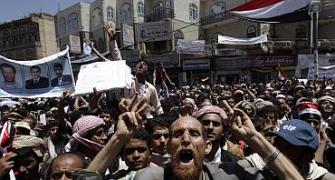Embattled Yemeni President Ali Abdullah Saleh on Friday rejected a plan for his exit mooted by Gulf states.
Plunging his strife-torn nation into a new crisis, Saleh told a pro-regime rally in capital Saana that the exit plan mooted by Gulf Cooperation Council states is "blatant interference in Yemeni affairs".
"We were born free and we have a free will and they have to respect our wishes," Al Jazeera channel reported.
A defiant Saleh said, "We reject any coup against democracy, the constitution and our freedom."
He said, "My power comes from my people and not from Qatar or anyone else."
Saleh's U-turn came just hours after his Foreign Minister Abu Bakr al-Kurbi had welcomed the deal offered by Qatar's Prime Minister Sheikh Hamad bin Jassem al-Thani, under which Saleh would step down, hand over powers to his deputy and go into exile with his family.
Meanwhile, Yemeni security forces killed two protesters and injured several others in the city of Taez in the south of Sanaa, local media reports said.
The city has witnessed violence against the 32-year rule of Saleh. The Yemeni president has been under mounting international pressure to bow out and has already angered Washington by his stubbornness.
According to media reports, US has frozen a record USD 1 billion assistance package to Yemen, marking a change in the American policy towards its anti-terror ally.
The American freeze, Wall Street Journal said, came as Washington was on the verge of rolling out the aid package, the largest ever bid at securing President Ali Abdullah Saleh's allegiance in its battle against Al Qaeda in the Arabian peninsula.
For US, the massive aid package was meant to hunt down plotters of the 'underwear' bombing in 2009 and the foiled air cargo bombing plot in October. For Saleh, the money would have helped shore up his political position. It would have been a reward for letting US special forces track down militants inside his country, the paper said.
Just less than a mile from where the Yemeni President was addressing his supporters, thousands of protestors had gathered with placards, asking him to step down.
But the strong presence of his ultra-loyal Republican Guards and troops of the dissident General Ali Mohsin separated the two rallies and no clashes were reported.
Earlier, Foreign Minister Abu Bakr al-Kurbi said that the government was studying the initiative by the GCC states to end the crisis in his country.
The US and its allies strongly backed the GCC deal, which was to go through by next week after a meeting in Saudi capital Riyadh between various groups in Yemen.
"The initiative of the foreign ministers of GCC is being studied by the political leadership of our country," Kurbi was quoted as saying in a statement by Al Jazeera.
The minister said that any initiative aimed at finding a solution to the crisis in his country was welcome.
Quoting US officials, the Wall Street Journal said the American assistance package had been put on freeze due to the outbreak of protests in Yemen and Saleh's heavy-handed approach in dealing with it.
"The Obama administration's suspension of new aid puts a spotlight on the unraveling of a troubled anti-terror alliance with a man who has ruled Yemen like a family fiefdom for three decades," the daily said.
The US package included almost $200 million in counter-terrorism support this fiscal year and another $155 million next year.
US officials are alarmed over the deteriorating situation in Yemen, where elite US trained special forces have largely abandoned the fight against militants to protect the capital against protesters.
The officials were aghast that Yemeni security forces had abandoned about half of their compounds in the oil-rich Al Qaeda infested province of Shebwa, where militants are reported to have seized government arsenal including heavy artillery.







